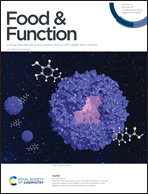Fuzhuan brick tea ameliorates hepatic steatosis and steatohepatitis through gut microbiota-derived aryl hydrocarbon receptor ligands in high-fat diet-induced obese mice†
Abstract
High-fat diet (HFD) induced obesity and its associated conditions, such as hepatic steatosis and steatohepatitis, are major health concerns worldwide. Previous studies have reported the excellent efficiency of Fuzhuan brick tea (FBT) in attenuating HFD-induced obesity and metabolic disorders. In this study, we investigated the effects of FBT on hepatic steatosis and simple steatohepatitis in HFD-induced obese mice, as well as the metabolic function of the gut microbiome using metagenomics and metabolomics. The results showed that FBT ameliorated dyslipidemia, hepatic steatosis and steatohepatitis in HFD-induced obese mice by normalizing the gut microbiota structure and tryptophan metabolism. FBT increased the cecal abundance of aryl hydrocarbon receptor (AhR)-ligand producing bacteria such as Lactobacillus_reuteri and Lactobacillus_johnsonii, at the expense of AhR-ligand consuming bacteria, such as Faecalibaculum_rodentium and Escherichia_coli, and elevated the cecal contents of AhR-ligands such as IAA, IPA, and KYNA. Furthermore, FBT regulated the expressions of AhR and its targeted lipometabolic genes such as Pemt, Fasn, and SREBP-1c, as well as other inflammatory genes including TNF-α, IL-6, and IL-1β in the liver of mice. Overall, these findings highlight the beneficial effects of FBT on obesity-related hepatic steatosis and steatohepatitis via microbiota-derived AhR signaling.



 Please wait while we load your content...
Please wait while we load your content...